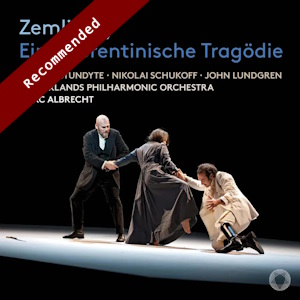
Alexander von Zemlinsky (1871-1942)
Eine florentinische Tragödie – Opera in one act (1917)
Guido Bardi, Prinz von Florenz: Nikolai Schukoff (tenor)
Simone, ein Kaufmann: John Lundgren (baritone)
Bianca, seine Frau: Ausrine Stundyte (soprano)
Netherland Philharmonic Orchestra/Marc Albrecht
rec. live composite, 14-28 November 2017, Dutch National Opera and Ballet, Amsterdam
German libretto with English translation
Pentatone PTC5186739 SACD [55]
Lasting just under an hour, with a cast of only three unpleasant characters and narrating a story of shocking moral perversion, Eine florentinische Tragödie is an odd duck – difficult to stage as it requires a companion piece to make up a full evening’s entertainment (if that is the right word) and hard to pair; perhaps Il tabarro or Pagliacci might work but that would surely constitute an overdose of mayhem and murder. Its menacing atmosphere has something in common with Bartók’s Bluebeard’s Castle, too – which might also make a suitable companion piece. It is rarely performed but lends itself to concert or semi-staged performance; this newest recording is derived from an four evenings at the Dutch National Opera and Ballet in 2017 and I am unclear as why its release has been so long delayed.
Its libretto is derived from a German translation of Oscar Wilde’s unfinished play and comparisons of it with the similarly lurid Salome have long been made. My acquaintance with the work has been through a 1997 recording on EMI conducted by James Conlon and starring Deborah Voigt and Donnie Ray Albert, which I enjoy, but I find David Kuebler’s pinched, nasal tenor hard to take; Heldentenor Nikolai Schukoff’s voice falls more pleasantly on the ear. Furthermore, I think the recorded sound in this new release is sharper and conductor Marc Albrecht finds more drive and passion in the score than James Conlon, making the most of Zemlinsky’s lush orchestration and surging style, starting with the orgasmic overture, which has more than a touch of Korngold and the Introduction to Strauss’ Der Rosenkavalier about it. He sustains a constant sense of menace underlying the rippling, fleetingly melodic line of the music which is sometimes lyrical, then semi-Sprechstimme in manner. The playing of the orchestra in the waltz passage when Simone raves about the curative powers of music like some deranged Orsino or Lorenzo is especially striking, as is the languorous, ecstatic love music depicting the embrace and kiss of Guido and Bianca (track 10).
Swedish dramatic baritone John Lundgren hasn’t quite as imposing a voice as Albert, but he is the more trenchant vocal actor and introduces more tonal variety in his characterisation. I am less enthused by Ausrine Stundyte, whose soprano has something of a beat in it but she has a lot less to do than the two male singers. There is the odd minor irritation or peculiarity, such as when, despite the stage direction “Softly to Bianca”, Schukoff makes no effort to “whisper” Guido’s declared intent to play the lute for her when they are alone, and occasionally the voices are drowned out by the orchestra, but for the most part this is a gripping performance of a macabre, strangely compelling work.
A full German libretto with English translation is provided in the neat cardboard pack. Stephen Barber recently reviewed a new release of this “shabby little shocker” from BR Klassik, expressing some reservations and retaining a preference for the Conlon recording mentioned above; I suspect that this latest version from Pentatone is the most recommendable yet.
Ralph Moore
Buying this recording via a link below generates revenue for MWI, which helps the site remain free




















